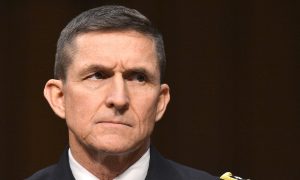
News Analysis
The FBI leadership kept pushing ahead with the investigation of former Trump adviser Lt. Gen. Michael Flynn even though its agents had been coming back again and again with evidence pointing to his innocence. Thats the picture painted by documents uncovered by a review of the Flynn case ordered in January by Attorney General William Barr.
The last discovery, 14 pages of material provided to Flynns lawyers on July 7, indicate that the FBI was looking to close the Flynn case in November 2016, but kept investigating on and on for no apparent reason.
Flynn, former head of the Defense Intelligence Agency under the Obama administration and former national security adviser to President Donald Trump, pleaded guilty in December 2017 to lying to the FBI. In January, he moved to withdraw the plea and proclaimed his innocence.
The Department of Justice (DOJ) dropped the case on May 7, but the presiding district judge, Emmet Sullivan, has refused to accept the dismissal and insisted on further proceedings to inquire about the dismissal.
Flynn was originally targeted by the FBI in August 2016 because of alleged ties to Russia and to determine if he was acting as an unregistered surrogate for Moscow. The allegation was mostly based on the fact that Flynn gave a paid interview to the Russian state-sponsored RT television and attended its anniversary gala in Moscow in 2015. He said it was one of many speaking engagements arranged for him by a speakers bureau he contracted.
The FBI was “looking to close” Flynns case in November 2016 as it “had not seen things to point to initial issue,” according to Jan. 25, 2017, handwritten notes of Tashina Gauhar, then-deputy assistant attorney general in the DOJs National Security Division (NSD).
Then, in November and December 2016, the FBI recovered Flynns calls with Sergey Kislyak, then-Russian ambassador to the United States, Gauhars notes say (pdf).
The bureau made “requests to foreign partners” and “info came back -> legitimate,” the notes say, indicating that nobody saw anything untoward in Flynns calls.
Indeed, then-FBI Director James Comey said the calls “appear legit” when he briefed President Barack Obama and his Vice President Joe Biden on Jan. 5, 2017, according to notes jotted down by then-FBI head of counterintelligence operations Peter Strzok.
It was Biden who brought up the Logan Act violation during that meeting, the notes indicate, while Obama told Comey “the right people” should be on the case.
The Logan Act—a potentially unconstitutional law that never has been successfully prosecuted—makes it illegal for citizens to negotiate with foreign officials without the consent of the White House.
It appears the FBI used it as grounds for keeping the Flynn case open based on Flynns conversations with Kislyak. Strzoks text messages show he scrambled to keep the case open on behalf of the FBI leadership even as Flynns case agent had already drafted the closing document.
The DOJ, however, poured cold water on that rationale.
“George: No reasonable pros do Logan Act,” say Strzoks Jan. 25, 2017, notes, meaning that George Toscas, then-Deputy Assistant Attorney General in the NSD, informed the FBI that no reasonable prosecutor would charge a Logan Act violation.
These notes, just as those of Gauhar, memorialize a meeting with eight other DOJ and FBI officials a day after Strzok and FBI Supervisory Special Agent Joe Pientka interviewed Flynn in the White House.
According to Gauhars notes, Flynn described his calls with Kislyak inaccurately on some points during the questioning, but the agents “believe that F. believe that what he said was true.”
Flynn was “telling truth as he believed it,” she wrote down.
“These documents establish that on January 25, 2017—the day after the agents ambushed him at the White House—the agents and DOJ officials knew General Flynns statements were not material to any investigation, that he was open and forthcoming with the agents, that he had no intent to deceive them, and that he believed he was fully truthful with them,” said Flynns lead lawyer, former federal prosecutor Sidney Powell, in a July 10 court filing (


